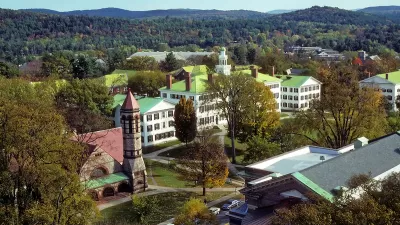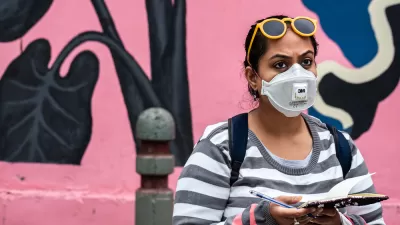As college students return for the fall semester, college towns are rightfully concerned about an influx of COVID cases, yet self-contained campuses have the potential to succeed where local and state governments may have failed.

Just as college campuses can be ideal environments to promote alternative transportation strategies, often running their own transit systems, charging for student parking, and even prohibiting freshman from owning cars, so too can they effectively deploy COVID-containment strategies, provided the motivation and leadership are present.
As noted in a recent post on coronavirus cases spiking in the Midwest, a Grand Forks public health official "said upwards of about 75% of the recent spate of new cases are the result of University of North Dakota students returning to campus." The Grand Forks Herald also observed that the university did not require students to get tested prior to arriving on campus, nor once they arrived on campus. Contrast that approach with Penn State University.
"As part of a layered detection and mitigation approach, Penn State will begin on Aug. 24 to conduct a randomized COVID-19 surveillance testing program University-wide to identify asymptomatic carriers of the virus and monitor the prevalence of COVID-19 across all campuses," begins a University press release (source article) from Penn State on Aug. 21. "The University will perform daily testing of at least 1% of the student, faculty and staff population across Penn State’s campuses."
Centers for Disease Control and Prevention alters testing guidance
The same day that Penn State began its randomized COVID-19 surveillance testing program to identify asymptomatic carriers, the CDC not only indicated that people without symptoms need not be tested, but even if they were exposed to known carriers, they need not be tested. Tom Frieden, who ran the CDC from 2009-2017, told the PBS Newshour that "it's really not defensible to say that asymptomatic contacts should not be tested." The American Medical Association called it "a recipe for community spread and more spikes in coronavirus."
As for mask mandates, Bill Schackner, the Pittsburgh Post-Gazette's higher education writer, reported on Aug. 20 on the performance of the university's “Mask Up or Pack Up" campaign.
Penn State is the latest high-profile university to warn students that reopening plans are being jeopardized by students partying and otherwise shunning social distancing rules. A day earlier, the University of Pittsburgh’s dean of students, Kenyon Bonner, said as much.
The University of Pittsburgh also runs a surveillance testing program, and the results are encouraging. "Since Aug 12, 1,225 students have been tested, with a positivity rate of 0.16%," reported Schackner on Aug. 24. The state with the lowest positivity rate on Aug. 27 was Vermont at 0.49%, according to the Johns Hopkins Coronavirus Resource Center.
How well is your college or university doing?
"A New York Times survey of more than 1,500 American colleges and universities — including every four-year public institution...has revealed at least 26,000 cases and 64 deaths since the pandemic began," according to a new college coronavirus tracker launched by the Times on Aug. 26. Scroll down to "Search for a school" and type the name in the box.
FULL STORY: Random surveillance testing begins for Penn State students, employees

Planetizen Federal Action Tracker
A weekly monitor of how Trump’s orders and actions are impacting planners and planning in America.

Congressman Proposes Bill to Rename DC Metro “Trump Train”
The Make Autorail Great Again Act would withhold federal funding to the system until the Washington Metropolitan Area Transit Authority (WMATA), rebrands as the Washington Metropolitan Authority for Greater Access (WMAGA).

The Simple Legislative Tool Transforming Vacant Downtowns
In California, Michigan and Georgia, an easy win is bringing dollars — and delight — back to city centers.

The States Losing Rural Delivery Rooms at an Alarming Pace
In some states, as few as 9% of rural hospitals still deliver babies. As a result, rising pre-term births, no adequate pre-term care and harrowing close calls are a growing reality.

The Small South Asian Republic Going all in on EVs
Thanks to one simple policy change less than five years ago, 65% of new cars in this Himalayan country are now electric.

DC Backpedals on Bike Lane Protection, Swaps Barriers for Paint
Citing aesthetic concerns, the city is removing the concrete barriers and flexposts that once separated Arizona Avenue cyclists from motor vehicles.
Urban Design for Planners 1: Software Tools
This six-course series explores essential urban design concepts using open source software and equips planners with the tools they need to participate fully in the urban design process.
Planning for Universal Design
Learn the tools for implementing Universal Design in planning regulations.
Smith Gee Studio
City of Charlotte
City of Camden Redevelopment Agency
City of Astoria
Transportation Research & Education Center (TREC) at Portland State University
US High Speed Rail Association
City of Camden Redevelopment Agency
Municipality of Princeton (NJ)




























